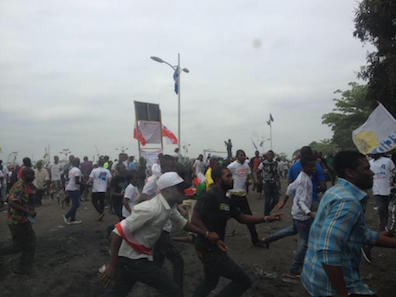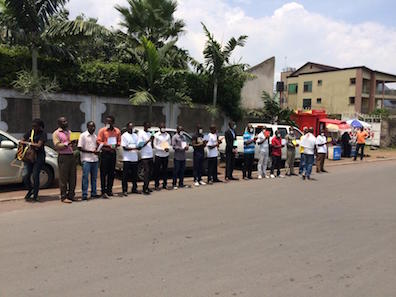|
By Staff Writers
Human Rights Watch
Monday, Sep 26, 2016
The Democratic Republic of Congo government’s decisions about its next presidential election will be critical for the country’s future, Human Rights Watch said in a report released September 18.
 |
| People fleeing a peaceful political demonstration in Kinshasa, capital of the Democratic Republic of Congo, when a group of hired thugs brutally attacked the demonstrators on September 15, 2015.
© 2015 BBC |
The report summarizes Human Rights Watch research over the past two years in which the government cracked down on activists and opposition party leaders and members who have opposed extending Joseph Kabila’s presidency beyond the constitutionally mandated two-term limit, which ends on December 19, 2016. It also includes recommendations to deter further abuses and prevent a broader crisis in the coming weeks and months.
A government-led “national dialogue” is due to present its final agreement in the coming days. Most of the main opposition parties have not participated in the process, viewing it as a ploy to delay elections and allow President Kabila to stay in power. Activists and opposition groups have called for nationwide protests beginning on September 19, three months before the end of Kabila’s term and when the electoral commission was constitutionally required to announce presidential elections.
Government repression has spiked in the days leading up to the planned protests. In the capital, Kinshasa, about a dozen pro-democracy youth activists were arrested following a meeting, on September 15, on non-violence, peace, and respect of the constitution. They are being held by the national intelligence agency, without charge and without access to their families or lawyers.
 |
| 18 people were arrested in Goma, in eastern Democratic Republic of Congo, during a peaceful demonstration organized by the youth movement Lutte pour le Changement (LUCHA) on March 15, 2016. They were released without charge on March 19.
© Timo Müller/ Human Rights Watch, March 15, 2016 |
On September 16, police in the southeastern city of Lubumbashi fired teargas and, later, live bullets to disperse opposition party members who were meeting to prepare the September 19 protests. Some meeting participants responded by throwing rocks, burning tires, blocking the roads, and looting several shops and offices. Dozens were arrested early the next morning.
On September 17, police and intelligence agents arrested human rights activist, Patrick Pindu, at his home in Kinshasa soon after he participated in a civil society meeting and press conference on elections. He was released the next day without charge on the condition that he report to the intelligence agency every 15 days.
To help deter violence, government officials and security forces should respect people’s right to freedom of expression and assembly and allow peaceful demonstrations and political meetings to go forward.
“The decisions President Kabila and his government will make in the coming weeks can make all the difference for Congo’s future,” said Daniel Bekele, Africa director at Human Rights Watch. “This is a critical opportunity for the country to strengthen democracy, the rule of law and human rights for its own future and for the entire region.”
Source URL
|
 Print This Print This

|

